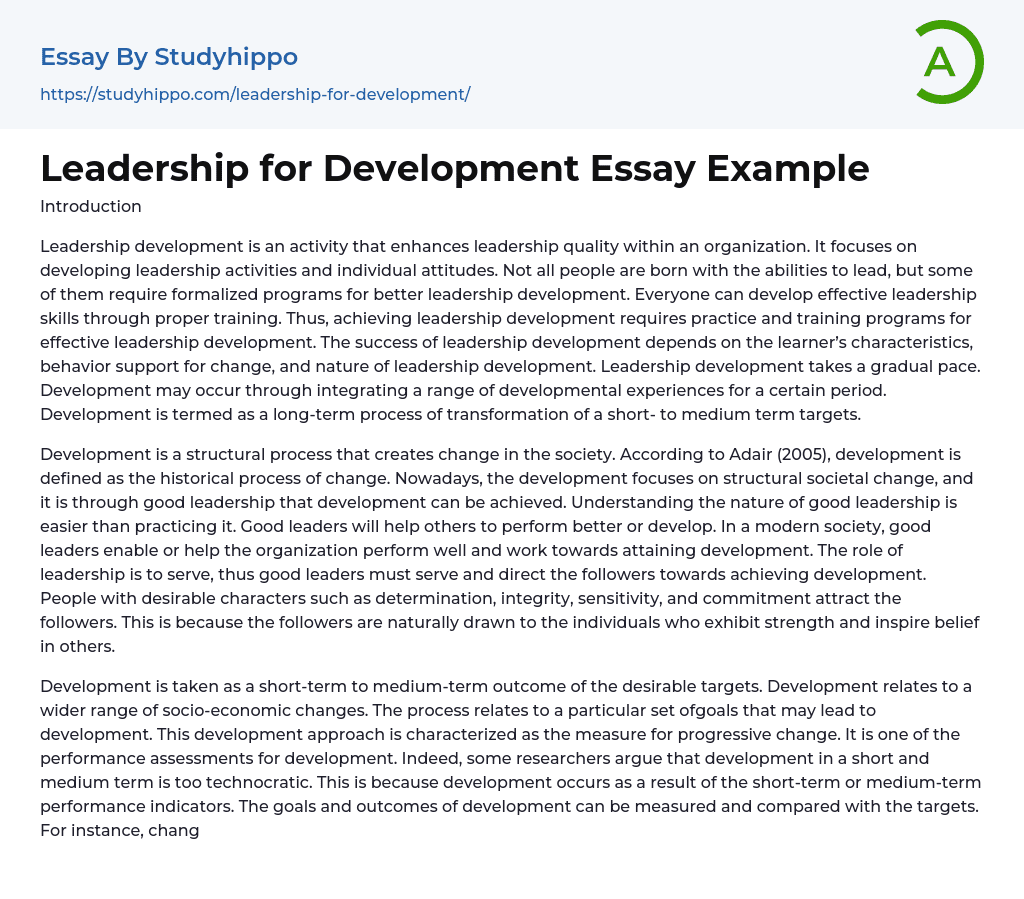Introduction
Leadership development is the act of enhancing leadership quality within an organization. It involves the development of leadership activities and individual attitudes. While not everyone is naturally born with leadership abilities, some individuals require structured programs to improve their leadership skills. Effective leadership skills can be developed through proper training, which emphasizes the importance of practice and training programs for successful leadership development.
The success of leadership development is determined by the learner's characteristics, behavior support for change, and the nature of the leadership development process. Leadership development occurs over a gradual period, integrating various developmental experiences for a specific duration. It entails a long-term transformation process that aims to achieve short- to medium-term goals. This structural process facilitates societal change.
According to Adair (2005), development is defined as a historical process of change. In t
...oday's society, development is focused on promoting structural societal changes, which can be achieved through effective leadership. While understanding the nature of good leadership is relatively straightforward, putting it into practice can be challenging. Good leaders support and encourage others to perform better and develop their skills. In the modern world, effective leaders enable organizations to excel and work towards achieving overall development.The role of leadership is to serve, so good leaders must serve and direct followers towards achieving development. People with determination, integrity, sensitivity, and commitment attract followers because they naturally gravitate towards individuals who exhibit strength and inspire belief in others. Development is seen as the desired outcome within a short-to-medium-term timeframe and encompasses a wide range of socio-economic changes. This approach to development is characterized by progressive change and serves as a measure for performance assessment. Some researchers argue
that a technocratic perspective prevails in short-to-medium-term development, as it is driven by performance indicators. These indicators enable the measurement and comparison of goals and outcomes, such as changes in income or poverty levels. Therefore, performance indicators are instrumental elements used by practitioners to measure developmental activities (Yost and Plunket, 2009).According to Weiss and Molinaro (2005), development can be achieved by good leadership, suggesting a paternalistic assumption that successful development relies on effective leadership. However, this perspective raises concerns about the democratic or effective participation of civil society in defining development objectives. Alternatively, a short-term instrument approach views development as a societal transformation, emphasizing a separation from socio-economic structures and social and political relations.
Another conceptualization of development, influenced by Western modernity, sees development as a dominant dialogue centered around visions of change and specific objectives. This perspective is rooted in Western ethnocentrism and is known as the post-modern conceptualization of development (Weiss and Molinaro, 2005).
This post-modern approach emerged during World War II in the developed world and focuses on poverty and other social constructs that are not addressed in traditional developmental discourse. It explores how leaders utilize their leadership skills in contemporary society to bring about developmental change. Adair (2005) argues that good leaders should leverage their skills to create developmental change, suggesting that effective leadership strategies are essential for achieving developmental goals.Additionally, in the modern world, development has been seen as a mechanism for production and management. As a result, strategies have been formulated to guide leaders in achieving development (Rondinelli and Aeffron, 2009). However, the concept of development has caused problems in society, such as delusions, crimes, increased corruption, and misallocation of funds
meant for development. This has made it challenging to achieve development, particularly in developing nations. To overcome these challenges, leaders must work diligently towards achieving developmental goals. Leadership development is an ongoing process that requires leaders to possess desirable qualities and collaborate as a team to promote development. One way to accomplish this is through succession planning, which involves the widespread transfer of knowledge and experience in building strong leadership. This is essential as it contributes to societal development. In conclusion, leadership for development enhances leadership quality within an organization. Leaders must possess desirable qualities that enable them to achieve developmental goals. Therefore, development can be seen as a long-term process of change or as a shorter-term pursuit of desired targets.The concept of development is centered around achieving desired goals within a short period of time. This process is aimed at specific objectives that can lead to development. Moreover, development is a significant aspect of Western modernity, functioning as a mechanism for production and management in the contemporary world.
- Academia essays
- Higher Education essays
- Language Learning essays
- Studying Business essays
- Education System essays
- Study essays
- First Day of School essays
- Scholarship essays
- Pedagogy essays
- Curriculum essays
- Coursework essays
- Studying Abroad essays
- Philosophy of Education essays
- Purpose of Education essays
- Brainstorming essays
- Educational Goals essays
- Importance Of College Education essays
- Brown V Board of Education essays
- The Importance Of Higher Education essays
- Online Education Vs Traditional Education essays
- Academic And Career Goals essays
- Academic Integrity essays
- Brown Vs Board Of Education essays
- Distance learning essays
- Technology in Education essays
- Vocabulary essays
- Writing Experience essays
- Importance of Education essays
- Early Childhood Education essays
- Academic Degree essays
- Academic Dishonesty essays
- School Uniform essays
- Academic writing essays
- Cheating essays
- Bachelor's Degree essays
- MBA essays
- College Life essays
- Grade essays
- Diploma essays
- Phonology essays
- Sentence essays
- Filipino Language essays
- Pragmatics essays
- Millennium Development Goals essays
- History Of Education essays
- Graduate School essays
- Middle School essays
- School essays
- Special Education essays
- University essays




